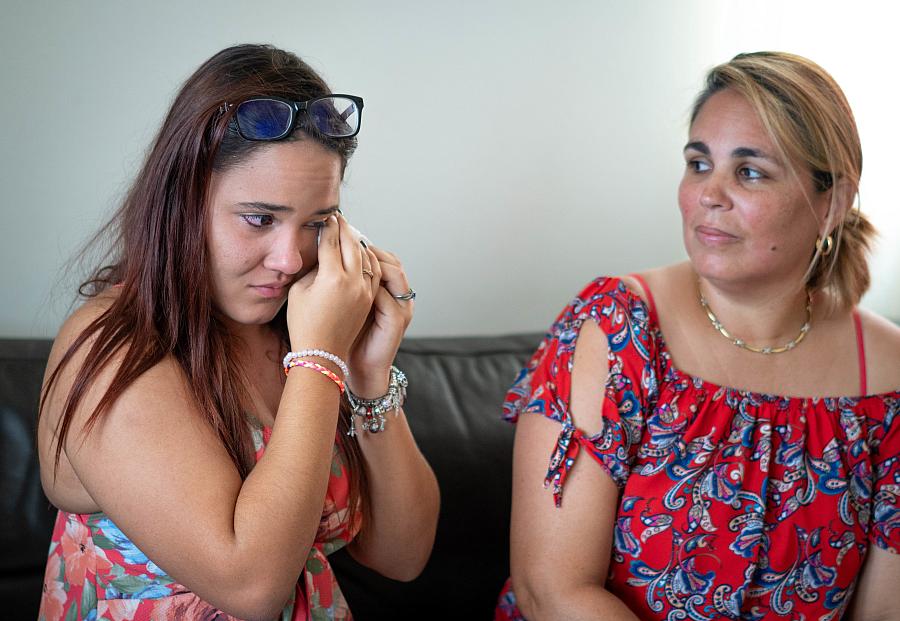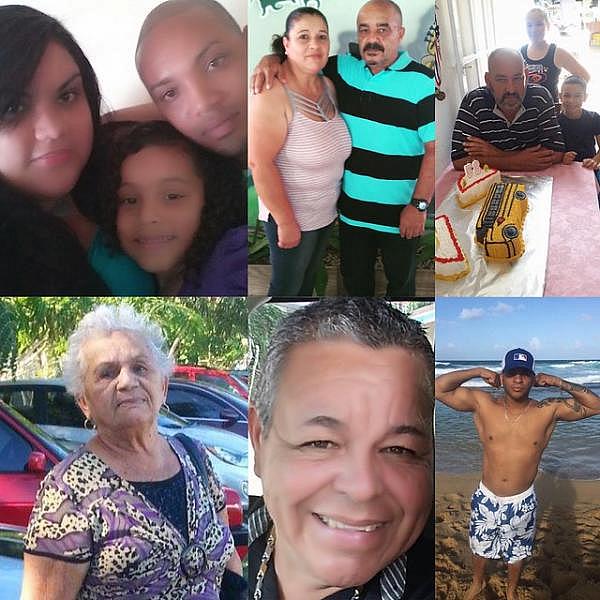In the wake of devastating hurricanes, Puerto Rican government mum as disease claimed lives

Karoline Vázquez Díaz got emotional as she described the pain she endured when she got sick with leptospirosis as she sat next to her mother, Brenda Díaz. (Photo by Angel Valentin)
Weeks after Hurricane María caused mass destruction in my native Puerto Rico, local and national media revealed the first known deaths caused by leptospirosis.
I didn’t know what leptospirosis was until I saw the stories of people getting sick and dying of this bacterial disease caused by the leptospira bacteria, which spreads primarily through soil and water contaminated by the urine of dogs, farm animals, rodents and other wildlife.
Humans become infected when the bacteria enters the body through any skin abrasion or contact with a mucous membrane — for instance, by wading through floodwaters. The bacteria survive for months and flooding after a hurricane helps it spread.
This is what happened in Puerto Rico after hurricanes Irma and María hit the island.
But it took 10 months for the public to learn that dozens of people had gotten sick and an outbreak of leptospirosis had broken out; that is, until the Center for Investigative Reporting of Puerto Rico (CPI in Spanish) and CNN published the story in July 2018.
CPI and CNN had to sue the government of Puerto Rico to obtain the database documenting all the deaths on the island between September 2017 and June 2018, including the death certificates. Months later I would learn these documents and the database would become the backbone of my story.
Initially, the Department of Health of Puerto Rico (DOH) denied that an epidemic had taken place, even after journalists shared the data they had obtained from the government’s own mortality database and other data from the Centers for Disease Control and Prevention, for which I had also filed a records request at the time. After I was awarded a 2018 National Fellowship by the Center for Health Journalism, I began delving into several issues related to the health care system of Puerto Rico and how the hurricanes’ devastation has impacted it.
This uncovered the intrinsic unfairness of how the island receives its Medicaid funding; and the tremendous impact that community health centers had in delivering health care to their communities with scant help from the government. Ultimately, I covered both stories.
But it wasn’t until I corresponded with a source on social media that I started to take a closer look at the victims of leptospirosis. This source shared with me the story of a young relative who had survived the bacterial disease in February of 2018, five months after María. She had initially been misdiagnosed by medical staff at the hospital and it was her family physician who ordered several diagnostic tests days later that revealed she had contracted leptospirosis. This may have saved her life.
She was able to share her story when I traveled to her home in the town of Morovis last year.
But during my visit to the island and the months that followed, a trend began to emerge as I talked to relatives of people who had died of the disease. They told me stories of how their loved ones showed up at clinics, emergency rooms, and hospitals complaining of high fever, muscle and joint aches, nausea, vomiting, and stomach pains, but medical staff were ill-equipped to diagnose leptospirosis, which is endemic to Puerto Rico.
The relatives’ accounts of what took place before their loved ones died suggest that the basic level of medical response was deficient after the storm and well into 2018. Delayed treatment led many patients into life-threatening situations — and even death.
By the time diagnostic tests were completed, some of them had been hospitalized for days without knowing what was making them sick or had returned for a second or third visit as their condition deteriorated. Unfortunately, in some cases the findings were not enough to save their lives because the infection had affected the function of vital organs.
The health impact of leptospirosis in Puerto Rico has been amply documented in research papers, but after Hurricane María it became clear that the island’s lack of active surveillance had prevented health officials from understanding the extent of the disease, as I showed in the story I wrote for the Center for Investigative Reporting of Puerto Rico as a Dennis A. Hunt grantee.
The relatives’ accounts of what took place before their loved ones died suggest that the basic level of medical response was deficient after the storm and well into 2018. Delayed treatment led many patients into life-threatening situations — and even death.
As I talked to more of the victims’ relatives, I realized that this was an untold story that the public had a right to know since many people on the island are not aware of this bacterial illness.
Most of the victims were men but there were women as well. The victims’ ages ranged from 17-to-90 years old. (Images courtesy of the families)
And it didn’t take long for me to understand that this is a complicated subject.
Leptospirosis is a tricky disease: it can be confused with other diseases like dengue, flu and Zika, and it can take repeated tests to diagnose.
Puerto Rico has a history of passive surveillance, under-reporting, and a lack of testing, even though half of the cases of leptospirosis documented for the whole United States each year occur on the island.
Experts told me that the number of deaths caused by leptospirosis were probably underreported because many people weren't even tested after the hurricane destroyed laboratory facilities, including the DOH lab.
Further, the absence of active surveillance and good diagnostic tests is a problem: Research shows that infected animals may continue to excrete the bacteria into the environment for years.
It is too soon to tell whether this story will have an impact on policy, but the public now knows this is an issue the government is not tackling as one would expect. The story has been widely shared through social media and I have already been approached by people who initially ignored my requests for interviews.
This fellowship allowed me to explore several health issues that, although complicated, can be ultimately rewarding.
The biggest challenge was to pry information from a government that doesn’t believe in transparency. For months, the governor of Puerto Rico denied that possibly thousands of people had died as a result of the hurricane, in part because of deficiencies in the government’s response to the disaster. A study by Harvard University later estimated the number of victims at 3,000.
And that has been exactly the DOH’s position on leptospirosis: they denied that an epidemic had taken place and that deaths resulted. DOH claimed that it launched an active surveillance program immediately after the hurricane, but my reporting doesn’t support that.
The biggest challenge was to pry information from a government that doesn’t believe in transparency. For months, the governor of Puerto Rico denied that possibly thousands of people had died as a result of the hurricane, in part because of deficiencies in the government’s response to the disaster.
One of the physicians who talked to me after I agreed not to publish his name said the government’s denial hit a nerve in the medical community.
“It was like they (DOH) were ridiculing us,” he told me.
Health officials didn’t have the capabilities to conduct diagnostic tests because their laboratory was destroyed by the hurricane. But it took 11 days for DOH to ask the Center for Disease Control and Prevention for assistance on building diagnostic testing, building surveillance and implementing a transport system for shipping samples from Puerto Rico to Atlanta.
The CDC arrived almost a month later with a team.
Towards the end of my reporting, as I was already writing the story, DOH press officials allowed me 10 minutes to interview the government epidemiologist, so I had to plan my questions carefully in order to maximize my one opportunity after trying for months. In any case she evaded many of my questions and insisted on the data and ultimately did not provide data for 2018.
DOH data doesn’t match the reality of what clinicians have experienced in the field, a doctor told me.
After spending months talking to countless victims, leptospirosis experts, and officials, one thing became clear: This is the tip of the iceberg on this story and there’s more ground to cover in the future.
Nobody could have summarized the core problem better than Dr. Johnny Rullán, former secretary of health and one of the government’s biggest critics.
“If there’s no surveillance, there’s no data and no outbreak, and if there’s no outbreak, there’s nothing to investigate, so why are we going to investigate something that doesn’t exist? That’s what the government is going to tell you,” he said. “We need to educate but we can’t allow those who are supposed to be protecting us to get away with doing nothing and continue this silent conspiracy.”
Here is some advice for reporters covering complex stories such as this:
Plan meticulously especially before traveling: Set up your schedule to conduct interviews, meet sources and officials for each day you’ll be traveling.
Pre-interviews are valuable: Something I learned from my time working on television as an investigative producer is that pre-interviews prevent wasting time. You can better plan the type of questions you are going to ask and how you want the interview to go. Also, it helps put subjects more at ease.
Be respectful, but keep trying: Many of the victims’ relatives were eager to share their stories with me, as painful as they were, but I had some trouble contacting some people. After the hurricane many left the island while others might have changed their phone numbers. So I wrote old-fashioned letters to the people I had left on my list whom I couldn’t track down in any other way, including social media. Some responded and others ignored me. I finally let it go after I called a mother who lost her 18-year-old son and she screamed at me on the phone.
Read, read and read: When reporting on complicated medical issues, read anything you can about the subject because a thorough understanding helps when the writing begins.
Spreadsheets and timelines are good tools: This is the best piece of advice I can give. I use spreadsheets for everything, including tracking down records requests and especially people. I also build a timeline that proves very helpful in keeping the story in perspective and in setting up the structure of my story.

